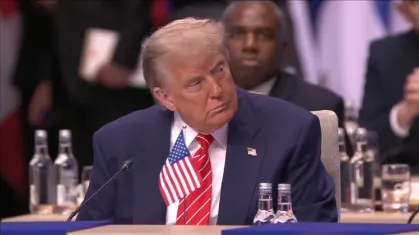
United States President Donald Trump intensified pressure on the US energy sector on June 23 after a series of oil traffic interruptions in the Ormuz Strait region.
Through social networking publications, Trump accused oil producers of contributing to the country’s opponents and asked the Department of Energy to immediately increase national production.
In one of his statements, Trump used the expression “Perfure, Baby, Perfure”, resuming the speech that marked his energy policy during the previous term. The reaction occurred hours after at least two super peers altered their routes in the Persian Gulf region, which contributed to the increase in oil prices to the highest level of the last five months.
KPLER AND LSEG platform tracking data indicate that vessels Coswisdom Lake – Chartered by the Chinese Unipepe – and South Loyalty – Programmed to carry Iraqi gross oil – reversed their courses as they approached the Strait of Ormez on June 22. After interruptions, both resumed their routes partially, but the episode generated widespread delays in oil transport in the region.
According to the consultancy Senta Shipbrokers, the volume of oil ships, both loaded and empty, who crossed the Ormuz Strait fell 27% and 32%, respectively, last week.
Part of the vessels anchored near Fujairah, the United Arab Emirates, while others were diverted to the coast of Oman. Navigation companies such as Nippon Yusen and Mitsui Osk Lines instructed their crews to reduce the length of stay in the Gulf.
Trump’s statements occurred at the same time as his political group has reinforced proposals to accelerate fossil fuel production. The former president’s team defends the flexibility of environmental rules, the expansion of drilling in public areas and the elimination of regulatory barriers to energy companies.
“We have the largest amount of oil and gas in any country on Earth-and we will use them,” Trump said in a statement made earlier this year, which was again reverberated by recent developments in the Middle East.
Chevron, one of the largest oil producers in the United States, reported a 19% growth in its production throughout 2024. However, the company’s executives point out that the increase in supply is conditioned on legislative revision on energy infrastructure licensing processes. Sector representatives also point to the volatility of markets and judicial disputes as obstacles to the rapid growth of production.
The tension in the Strait of Ormuz gained new contours after the Iranian parliament approved a measure to close the sea pass, which still awaits the authorization of higher instances of the country. Although the narrow continues to operate, the announcement raised the perception of risk to global oil trade and increased pressure for the United States to adopt immediate response actions.
The Strait of Ormuz is one of the leading strategic points for sea transportation in the world. About one fifth of globally traded oil passes through this route. Instability in the region is observed carefully by governments, power companies and financial markets.
The White House, under the guidance of Trump’s group, is mobilizing efforts to review national energy policies in response to the statement declared in the sector. Priorities include incentive for drilling in federal lands and unlocking projects involving pipelines and refineries.
Trump’s decision to speak publicly on the subject occurs amid internal disputes on the conduct of US energy policy. While current administration adopts a mixed approach between clean energy expansion and maintenance of fossil reserves, the former president has reinforced the discourse of self-sufficiency and energy independence through intensive oil and gas exploration.
Sector companies await the consequences of the Iranian proposal and the responses of the US authorities. The global market remains unstable in the face of the risk of blocking the main sea export sea in the Middle East.
The increase in prices, recorded shortly after the oil routes deviations, rekindled the debate on the vulnerability of energy logistics chains and the role of the United States in global supply. For Trump and allies, the solution is in large -scale internal production. The Department of Energy, according to sources close to the former president’s team, has already received guidance to review goals and accelerate ongoing projects.
With the advancement of geopolitical tension, the coming days should be decisive for the definition of new oil production and export guidelines by the United States. The potential impact on the global market will depend on the political and operational response to the threat of closing the country’s Strait and the country’s ability to rapidly raise its production.
With information from The Cradle
Source: https://www.ocafezinho.com/2025/06/25/trump-pressiona-petroleiras-dos-eua-para-aumentarem-a-producao-apos-tensao-com-ira/

